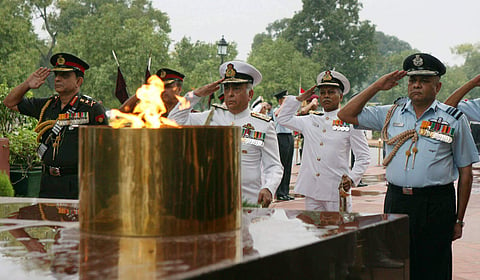

NEW DELHI: The iconic Amar Jawan Jyoti at the India Gate will be extinguished forever on Friday as it will be merged with the perennial flame burning at the National War Memorial.
“The Amar Jawan Jyoti is being merged with the eternal flame at the National War Memorial on Friday with an appropriate military ceremony.” told an Army Officer.
Amar Jawan Jyoti was inaugurated on 26 Jan 1972 to commemorate India’s victory in the 1971 Indo-Pak war, and as the nation’s tribute to the brave soldiers who laid down their lives. The monument consists of a platform on which a cenotaph is situated. On the top of the cenotaph is a rifle that stands on its barrel and a helmet is placed on the top of the rifle. The platform is bound by four urns that hold continuously burning flames called the Amar Jawan Jyoti.
Till the inauguration of the National War Memorial (NWM) India did not have a war memorial dedicated exclusively to the Indian Armed Forces. The India Gate was constructed in 1931 and remains a memorial to the soldiers from India who died in action.
The 42-metre-high All India War Memorial Arch was built in honour of more than 80,000 soldiers who died in the First World War (1914-1918) and the Third Anglo-Afghan War (1919). The structure has the names of 13, 516 soldiers inscribed on its surface.
The National War Memorial was inaugurated in February 2019 in honour of soldiers of the Indian Armed Forces who have made the supreme sacrifice to defend the sovereignty and integrity of the country.
The NWM has 29,000 tablets on which 25,942 names have been etched and it is updated when a soldier is killed in action. These names are of the soldiers who have sacrificed their lives after 1947, including Kargil war and the ongoing proxy war.
The design of the Memorial has four Chakras with Amar Chakra (Circle of Immortality) having an Obelisk with Eternal Flame. The flame symbolises the immortality of the spirit of fallen soldiers with the assurance that the Nation will never forget their sacrifices.
Since its inauguration, all homage ceremonies are held at NWM.
Consequent to the conclusion of the Swarnim Vijay Celebrations flames from across the nation were merged with the flame at the NWM with which the Amar Jawan Jyoti is being merged on Friday.